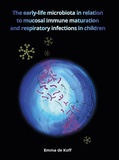The early-life microbiota in relation to mucosal immune maturation and respiratory infections in children

Koff, Emma de
- Promoter:
- Prof.dr. D. (Debby) Bogaert & prof.dr. E.A.M. (Lieke) Sanders
- Co-promoter:
- Dr. M.A. (Marlies) van Houten
- Research group:
- Sanders
- Date:
- April 11, 2023
- Time:
- 14:15 h
Summary
The development of the human microbiome starts with the partially transmitted microbiota from mother to child during birth and continues in the first years of life under the influence of factors like nutrition, daycare attendance and antibiotics use. An increasing number of studies imply a relationship between the composition of the microbiome in early life and the risk of developing both infectious diseases and immune-mediated chronic disorders, such as asthma and allergies, in later life. In this thesis, we studied correlations of the early-life composition of the upper respiratory and intestinal microbiome with mucosal antibody concentrations in saliva and antibody responses to routinely administered vaccines, respectively. These studies suggested that a microbiome with a higher abundance of beneficial bacteria in the first weeks of life, which was more often found in infants who were born via vaginal delivery in contrast to caesarian section and who were (partially) breastfed, might be favorable for the early development of antibody responses. Furthermore, we demonstrated that the respiratory microbiome composition was heavily disrupted during severe respiratory tract infections requiring hospitalization, but recovered well after the acute infection, albeit not in all children. Diminished recovery of the microbiome following a severe respiratory infection was, in turn, associated with more frequent recurrence of respiratory complaints and infections. Finally, we showed that saliva could be more frequently considered as a non-invasive specimen in infection and immunity research. In conclusion, this thesis proposes leads for further research to develop methods to manipulate the early-life microbiome and potentially attain a beneficial effect on child health.